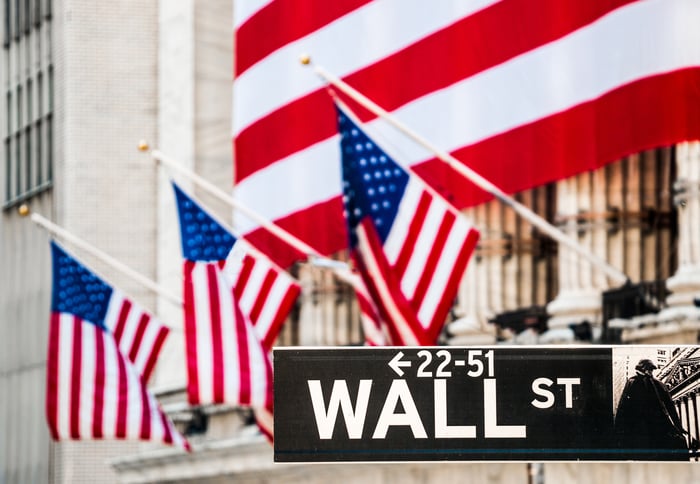In case you missed it, one of the most important data releases of the third quarter happened last week. Aug. 16 marked the deadline for institutional firms and hedge funds with at least $100 million in assets under management to file Form 13F with the Securities and Exchange Commission.
A 13F is effectively a snapshot of what institutional investment firms and hedge funds were holding, as of June 30, 2021. In other words, it allows investors to see what some of the brightest minds on Wall Street were up to, in terms of buying and selling activity, over the previous quarter. Despite being over six weeks old when filed, 13Fs can still provide invaluable information as to what stocks or trends are driving interest on Wall Street.
Interestingly, successful money managers wanted little to do with many of the Dow Jones Industrial Average's (^DJI -0.02%) 30 components in the second quarter. According to data from 13F aggregator WhaleWisdom.com, only seven of the 30 Dow stocks saw their total shares owned by 13F filers rise during the second quarter. It's a surprising statistic given that the Dow is comprised of profitable, time-tested businesses.

Image source: Getty Images.
But there were exceptions. Three Dow stocks did catch the attention of billionaire money managers, who couldn't stop buying these stocks in the second quarter.
Salesforce
One of the most popular additions to billionaire money managers' portfolios during the second quarter was cloud-based customer relationship management software provider Salesforce.com (CRM -1.06%). Salesforce, the fastest-growing Dow stock, saw its aggregate shares held by 13F filers increase by more than 13 million in Q2.
In terms of billionaire investors, Israel Englander's Millennium Management and Jim Simons' Renaissance Technologies had no problem significantly increasing their respective positions. Millennium added 936,872 shares, with Renaissance roughly quadrupling its previous stake with the addition of 774,700 shares.
Salesforce is the unquestioned leader of CRM software, which is used by consumer-facing businesses to maintain/improve client relationships and grow sales. CRM software allows a company to log and access client data in real time, manage online marketing campaigns, oversee client service issues, and run predictive sales analyses on its existing customer base. While it's a no-brainer solution for the retail and service industries, it's becoming more mainstream in the finance, industrial, and healthcare space.
Just how dominant is Salesforce? When IDC examined global CRM revenue in the first half of 2020, it found that Salesforce accounted for a 19.8% share. The No.'s 2 through 5, Oracle, SAP, Adobe, and Microsoft, didn't even combine to add up to Salesforce's nearly 20% share of the CRM market. Suffice it to say, its place atop the CRM leaderboard is secure for a while.
Another reason Salesforce has continued to excel is the leadership of CEO Marc Benioff. Benioff has overseen a number of critical acquisitions (e.g., MuleSoft and Tableau), with the latest being cloud-based enterprise communications platform Slack Technologies. The great thing about the Slack deal isn't the company's new revenue channel. Rather, it's the ability to use Slack's platform as a jumping-off point to cross-sell its CRM solutions to small and medium-sized businesses.
With Benioff aiming for Salesforce to hit $50 billion in annual sales by fiscal 2026 (up from $21.3 billion in fiscal 2021), it looks like a solid buy.

Image source: Getty Images.
IBM
Arguably the most surprising Dow stock that billionaire money managers couldn't stop buying in the second quarter is tech stalwart IBM (IBM -1.31%). When the quarter came to a close, aggregate 13F filers owned nearly 3.9 million more shares of IBM than they did on March 31.
But what really stands out is the buying from Jeff Yass's Susquehanna International and Ken Griffin's Citadel Advisors. Susquehanna increased its existing stake in IBM by 342,942 shares, while Citadel Advisors scooped up 598,000 call options, which lifted its call stake to north of 3.2 million. Call options are usually purchased by investors who expect a stock's share price to head higher.
What makes these moves so surprising is that IBM has been a perpetual laggard for nearly a decade. The company waited too long to shift its focus to cloud computing, and has paid a dear price for its tardiness. For much of the past seven years, IBM's revenue has trended modestly lower as sales in its legacy operations shrank.
The good news for IBM is that it's been making strides organically and via acquisition to beef up its cloud presence, and those efforts are finally being reflected in its operating results. For example, IBM's cloud revenue rose 13% in the second quarter to $7 billion, which accounted for roughly 37% of the company's quarterly sales. Since cloud margins are substantially higher than the margins tied to its legacy operations, even modest revenue growth can lead to substantially faster cash flow expansion.
What's more, the niche that IBM is targeting is well-suited for ongoing expansion. Big Blue is specifically focused on hybrid cloud solutions -- i.e., those that combine public and private clouds, and allow for data and applications to be shared between those services. Hybrid cloud demand should be especially strong during and following the pandemic. That's because these solutions are perfect for hybrid work environments, since remote workforces are now commonplace.
Even though IBM's low single-digit sales growth in the near-term leaves a lot to be desired, the company looks to finally be headed in the right direction after a decade of sluggishness. When you tack on its market-crushing 4.7% yield, there's more than enough for billionaire money managers to get excited about.

Image source: Walmart.
Walmart
The third and final Dow stock billionaire money managers couldn't stop buying in the second quarter is retail juggernaut Walmart (WMT -0.68%). As of June 30, 13F filers held approximately 17.3 million more shares of the company than they did at the end of the first quarter.
Among billionaire money managers, Larry Fink's BlackRock, Citadel Advisors, Renaissance Technologies, and Millennium Management all got in on the party. BlackRock added to its existing position with a 2.21-million-share buy, while Citadel, Renaissance, and Millennium added roughly 2.08 million shares, 1.82 million shares, and 1.62 million shares to their respective stakes.
One of the most logical reasons for these big-money investors to buy into Walmart is to take advantage of what's likely going to be a multiyear period of expansion. Even though recessions are an inevitable part of the economic cycle, they're often measured in months or span a few quarters. Meanwhile, periods of economic expansion often last years. Since Walmart is predominantly a sales-oriented business, it's primed to take advantage of a steadily expanding U.S. and global economy over time. It's that simple.
It also doesn't hurt that Walmart's scale provides clear-cut competitive advantages. The company's size and deep pockets allow it to purchase goods in bulk, which lowers the unit price it pays. This is why it can typically undercut mom-and-pop retail stores and garner new business.
What's been most impressive about Walmart of late is the company's direct-to-consumer push. Doug McMillon, the CEO of Walmart, anticipates that global e-commerce sales will reach $75 billion in the current fiscal year (2022). Within the U.S., it makes Walmart the second largest online retailer behind Amazon.
As with IBM, Walmart's growth rate isn't going to drop any jaws. However, with more of its sales being generated online and the company aggressively repurchasing up to $20 billion worth of its common stock, there's plenty of reason for billionaires to be modestly bullish.





